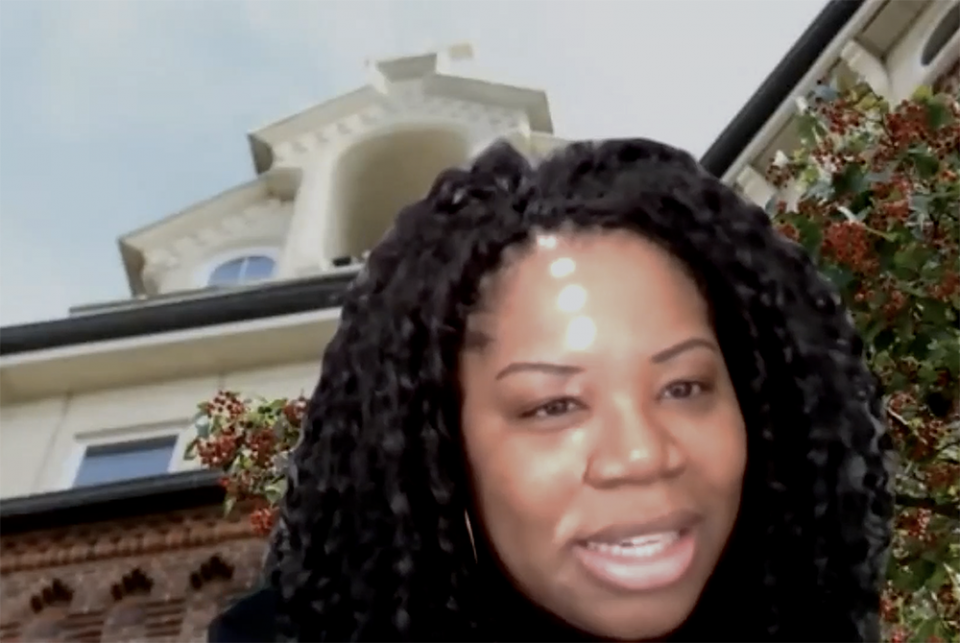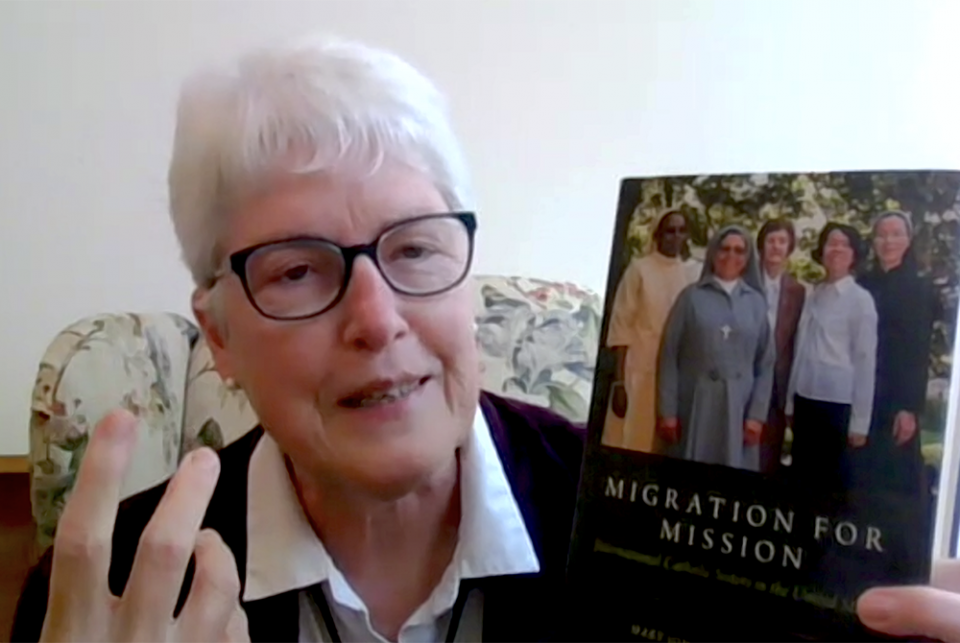Shannen Dee Williams RFC Seminar (2).png

One of the greatest weapons of white supremacy has been to control how history is told, but an accurate teaching would not only counter those efforts but could lead toward real reconciliation, a scholar says.
Shannen Dee Williams, a professor of history at the University of Dayton and the author of Subversive Habits: Black Catholic Nuns in the Long African American Freedom Struggle, which is scheduled to be published by Duke University Press in the spring, told attendees at the Religious Formation Conference's Congress Nov. 3 that the history of Black Catholics, and especially of Black Catholic sisters, has been obscured or even erased by those who want to hide the past.
The congress, which occurs every other year, was set to be held in Chicago, but had to be done virtually because of the pandemic. At least 300 attendees are registered; the congress runs Nov. 2-7.
"Many Black Catholics who are with us today can trace their roots to the very earliest days of the church," Williams said. "Many of their roots in the American church predate their European counterparts by more than a century."
The first Christian marriage recorded in what would become the United States was a free Black Catholic woman marrying a soldier in 1565 in what was then Spanish Florida, she said, and many of the first Catholics here were Blacks who converted in exchange for freedom, or escaped slaves who went south from the American colonies.
"A far more complicated and complex understanding … needs to be disseminated," Williams said. "The route of many African Americans to freedom was through the Catholic Church."
All of which means that Black Catholic history has always been Catholic history, and any telling that leaves Blacks' role out is far from complete.
But that history is often left out thanks to four myths perpetuated by white supremacy, Williams said.
The first is that the history of Black Catholics is inconsequential and primarily a story of 20th century migration and conversion, she said. In fact, Sr. Anne Marie Becraft founded the first Catholic school open to Black girls in Washington, D.C. in 1820 and has a direct bloodline to the early American church — her grandfather was Charles Carroll of Carrollton, the only Catholic signer of the Declaration of Independence. Becraft was a member of the Oblate Sisters of Providence, the first successful order in the world founded by women of African descent.
The second myth is that the Catholic Church was a reluctant and benevolent participant in chattel slavery. But the Catholic Church was the first and largest slaveholder in the Americas, Williams said, and the vast majority of U.S. bishops, sisters and lay members supported the Confederacy and upheld segregation. While it's true Pope Gregory XVI condemned the Atlantic slave trade in 1839, that condemnation didn't come until more than three centuries after the church began owning slaves in the Americas, three decades after the United States and Great Britain banned their own participation in international slave trading and six years after Great Britain abolished slavery in its territories in the Americas.
While people point to Gregory's condemnation, late as it was, they forget the series of papal endorsements of slavery throughout the 15th century, leading to the forced migration of 12-15 million people to the Americas, she said. In fact, the first Catholic Chapel established in sub-Saharan Africa is at Elmira Slave Castle in what is now Ghana — it sits over the dungeon.
In the early days of European colonization, "the vast majority of the faithful in the Americas are Native American and those of African descent," Williams said. "And yet when we tell the story of Catholicism in America, we oftentimes erase the African foundation of it."
Advertisement
Advertisement
The third myth, Williams said, is that the Catholic Church was at the forefront of desegregation in the United States. While there were certainly individuals and some institutions that were, they were the exceptions.
The U.S. Catholic bishops were the last of the leaders of the nation's 25 major denominations to endorse the 1954 Brown v. Board of Education decision outlawing segregation in public schools. Pope Pius XII told them to endorse it immediately, she said, they instead waited four years.
Meanwhile, the bishops' adherents were some of the most virulent leaders fighting desegregation, including a group of Catholic women that jeered, harassed and threatened Black children desegregating New Orleans public schools, including Ruby Bridges, whose courage was made famous in a Norman Rockwell painting.
"We also have this very painful history of segregation and exclusion in religious life," Williams said, of which she has written about and presented on extensively.
That segregation and exclusion fueled the fourth myth, that there are no Black women religious.
While there are far too few of them, they certainly exist, including three congregations of primarily Black women — the Oblate Sisters of Providence in Baltimore, the Sisters of the Holy Family in New Orleans, and the Franciscan Handmaids of the Most Pure Heart of Mary in New York.
Some of their history may never be known, thanks to archival erasures.
"One greatest testaments to the ferocity with which black vocations were rejected within the Catholic Church is the fact that we don't know for certain who the nation's first black sister was," Williams said. "We don't know her name or the circumstances of her life."
But telling this history — the good and the bad — can change the future.
"If we do in fact teach an accurate and critical understanding of our past, then we have a shot at moving toward what reparation can look like," Williams said. "But communities first have to understand this history — one of the greatest weapons of white supremacy has been its ability to erase its history of violence, and its victims. … We can't put together a package of reparation that will adequately address these wrongs unless we know what happened."
Mary Johnson RFC Seminar (1).png

Also giving a seminar Nov. 3 was Sr. Mary Johnson, a Sister of Notre Dame de Namur and a professor of sociology and religious studies at Trinity Washington University, where she is also co-director of the Billiart Center for Social Justice. Johnson spoke about the latest book she co-authored, Migration for Mission: International Catholic Sisters in the United States.
The authors surveyed 560 religious institutes and found more than 4,000 sisters who were born elsewhere but were in the United States to minister or study. One in every 10 women religious in the United States is foreign-born, they learned.
That number will certainly change, Johnson said, as many of them are elderly sisters originally from Ireland who arrived in the 1940s and 1950s. Now, sisters are arriving from Asia, Africa and Latin America.
"Unlike a century ago, they are not, for the most part, serving just their own ethnic communities," she said. "And one of the most striking characteristics of international sisters in the United States today is that many come highly educated. They come with graduate degrees. They are highly credentialed."
Johnson said their research shows the formation community needs to be better prepared for international women, those women need to each have a mentor, they often need help navigating the immigration system, and there is a crisis in finding communal housing.
She also said international priests in the United States need to be educated on gender issues here.
"They've got to be prepared to work with women in general and women religious in particular," Johnson said. "Some have come with the mindset that women religious are to be their servants."
On Saturday night, Johnson is scheduled to receive the Religious Formation Conference's Mary Emil Penet Award.
Like what you're reading? Sign up for GSR e-newsletters!


